Poisoning Facts and Tips for Prevention
Health
Introduction
Welcome to a comprehensive guide on poisoning facts and tips for prevention brought to you by MUIR DIABLO OCCUPATIONAL MEDICINE, a trusted name in the field of health. In this article, we will explore the various aspects of poisoning, including its causes, symptoms, prevention methods, and how you can ensure the safety of yourself and your loved ones from poisonings. The information provided here aims to equip you with the knowledge necessary to make informed decisions and take preventive measures against poisoning incidents.
Understanding Poisoning
Poisoning occurs when a harmful substance enters the body, either accidentally or intentionally, leading to adverse health effects. These substances, known as poisons, can be found in various forms, such as chemicals, medications, plants, or even household products. It is essential to note that poisonings can affect individuals of all ages, making it crucial to adopt preventive measures to safeguard your well-being.
Common Causes of Poisoning
Poisonings can arise from numerous sources. Some common causes include:
- Accidental ingestion of toxic substances
- Exposure to harmful chemicals in the workplace
- Misuse or overdose of medications
- Inhalation of toxic fumes or gases
- Consumption of contaminated food or water
- Bites or stings from poisonous animals or insects
Recognizing the Symptoms
Identifying the symptoms of poisoning is crucial for prompt treatment. Symptoms may vary depending on the type of poison and the affected individual. However, some common signs to watch for include:
- Nausea and vomiting
- Abdominal pain
- Dizziness or lightheadedness
- Breathing difficulties
- Headaches
- Confusion or disorientation
- Seizures
- Unexplained rashes or skin irritations
Prevention is Key
Taking preventive measures to avoid poisonings is of utmost importance. Here are some essential tips to keep in mind:
1. Store Toxic Substances Safely
Ensure that all toxic substances, including cleaning products, pesticides, and medications, are stored securely out of reach of children and pets. Use childproof locks or latches on cabinets and drawers to minimize the risk of accidental ingestion.
2. Proper Waste Disposal
Dispose of hazardous waste, such as expired medications or chemicals, correctly. Follow local guidelines for disposing of such substances to prevent environmental contamination and potential harm to others.
3. Be Cautious with Medications
Always read and follow the dosage instructions provided with medications carefully. Store them in their original containers and avoid mixing different medications unless instructed by a healthcare professional.
4. Educate Yourself
Stay informed about potential poisons in your environment. Research common household plants, foods, and substances that can be toxic, especially to children and pets. Educate yourself about their potential dangers and take necessary precautions.
5. Use Protective Gear
If you work in an environment where exposure to harmful chemicals is a possibility, ensure you use appropriate protective gear, such as gloves, masks, or goggles. Follow all safety protocols provided by your employer to minimize the risk of poisoning.
MUIR DIABLO OCCUPATIONAL MEDICINE Can Help
At MUIR DIABLO OCCUPATIONAL MEDICINE, we prioritize your well-being and provide professional medical services to address poisoning concerns. Our team of experts is well-equipped to offer advice, treatment, and support. Contact us today to learn more about how we can assist you in creating a safe and poison-free environment for yourself and your loved ones.
Conclusion
In conclusion, understanding poisoning facts and implementing preventive measures are critical steps to safeguarding your health and the well-being of those around you. By adopting the tips outlined in this article and seeking assistance from professionals like MUIR DIABLO OCCUPATIONAL MEDICINE, you can play an active role in preventing poisonings and promoting a safer environment.




